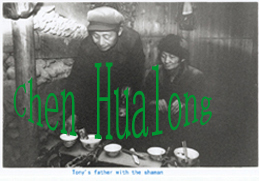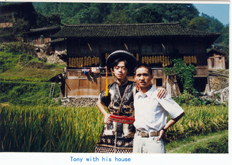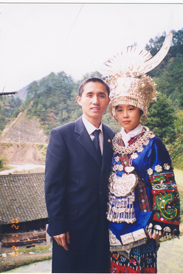 |
Tony's Guizhou Tribal Articles | Home |
 |
 |
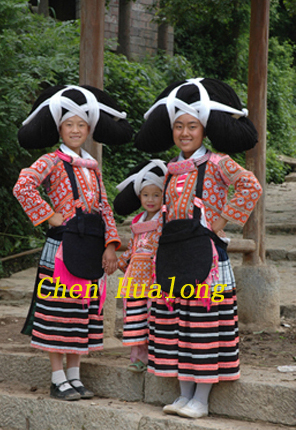 |
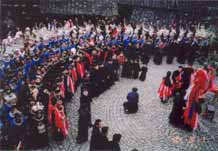 |
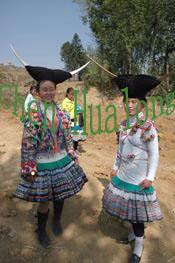 |
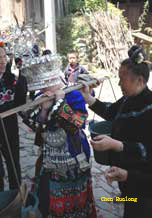 |
| The
Miao shaman's ceremony
Maybe as I am a Miao and
because I have lived in a small village for 18 years absorbing and
understanding the great richness of the Miao culture, I deeply love
this ancient and gorgeous tradition. This knowledge comes from my
own experience of being a Miao and living in the community and not
from books. I would like to share this knowledge with various enthusiasts
who also seek to understand different cultures. The Miao are one of the 55 minorities in China and are mainly concentrated in Southwest China. About 4.19 million of the Miao make their home in Guizhou province where there is a hidden, mysterious civilization and magical ceremonies. The Miao in the region where I have lived are sometimes known as the Long Skirt Miao by the length of a woman's skirt or as Black Miao due to the colour of a woman's costume. However, I prefer to call them Xijiang style Miao because of their location. Xijiang is the symbolic village of this small group and I think it is more appropriate and technically correct to name my group in this way. ceGenerally speaking in my community, there are two, three, or maybe more shamans in a big Miao village which usually has over 100 families. Small villages sometimes do not have a shaman. The Miao here are animist and shamanist, so the shaman is respected by every one and is engaged in hosting or participating in any important ceremonies in the community. When a member of a family gets sick or does not feel well, the family think that this must be caused by some bad spirits. They then have to find a shaman to hold a ceremony. In order to enable the following explanation to be easily understood I will use myself as an example. If I become ill or do not feel well, my parents will find a shaman to come to my house and carry out a ceremony so as to save my life. They believe that I must have lost my soul which is on its way to the deep jungle on Leigongshan Mountain with the evil spirits. A Miao village named Jioushijiou - ninety nine in English - on Mount Leigongshan, is believed to be the place where spirits come from. That is to say, if my lost soul was confused by evil spirits and followed them to Jioushijiou and did not return to my body,I would die. When the shaman carries out the
ceremony with the supernatural he always needs a male assistant
to help him. At the start the shaman wears a piece of kerchief covering
his face. I soak my feet in a basin of water and step onto the ground
to make a footprint. Then the assistant (usually my uncle) uses
a ri straw to measure it and cuts it to same length as the footprint
for later use. After this the shaman creates a circle between himself
and the onlookers by taking water into his mouth and spraying it
around him. This is to protect them from his sword for when he is
in a trance he only sees the spirits and his assistant. The shaman
uses a sword as a ladder to climb up to heaven. Some shamans use
an iron hoop decorated with a bunch of bells as a magical instrument.
After the death of one old shaman, the young shaman in my village
used an iron hoop for the ceremony. After swallowing grains of raw,
unhusked rice, the shaman starts to belch and shake his legs from
side to side followed by singing many folk songs. The songs are
to call for the good spirits to come back into the shaman's body
and give him supernatural powers. It is said that a very skilled
shaman owns some 100 spirits and an ordinary one only has about
20 to 30 spirits or ghosts. These ghosts are dead heroes or ordinary
people of the village or a nearby village. Yang Dalou is a popular
ghost hero who was one of the leaders of the Miao uprising against
the Qing government between AD 1854-1872. The ghosts come to help
the shaman so that he can see all the good spirits, bad ghosts and
my lost soul and even communicate with them. After singing for about
10 to 20 minutes by which time all the good spirits will have returned,
the shaman's body becomes heavier and heavier and he falls down
from his desk or chair. The assistant has to try his best to help
him to regain his seat. Then the shaman beats his bare palms with
the iron hoop like a horse getting shod for a long and tiresome
trip. The assistant is called " Balang'' in my language. The shaman says to the assistant: 'Balang, Balang…, Go, go, let's go the lower way by riding a horse.' No, no, we can't go the lower way by riding a horse. We must go the upper way by flying' replies the assistant. Then the shaman imitates flying like an eagle. Sometimes he whistles. At times he waves his hands and feet looking like an eagle flying in the sky. Usually the shaman from my village starts the journey from the paper making plant in Guading, Sankeshu town, along the Bala river and up to its upper reaches. Of course there are many crossroads where the shaman encounters lots of footprints and the prints of the lost soul are mixed with footprints of other ghosts or people. He does not know which way my lost soul had taken.Thus the assistant gives him a rice straw to measure the footprint to see if it is from my lost soul. The shaman cuts the straw and hands it to the assistant to check if the cut one is the same length as the prepared one. If it is the assistant says 'Yes' the shaman will know which way he should go to find the lost soul. If it is not, the shaman may have to do this numerous times until the two rice straws are the same length. He will do this at every crossroads. Finally the shaman finds my lost soul. At that moment, the lost soul is happily walking along with the evil spirits to the jungle. The shaman has to sing a soft and sad little song many times to persuade the lost soul to come back into my body. He sings: "gi gi lao, ji da gi da zii, gi gi lao, ji da gi da zii, ang kang ou, ang kang ou, an kang, an kang, ou" in the Miao language which means "My dear, come here, come here, come here slowly."' If the shaman cannot persuade the soul to come back into my body, I will die; so the shaman works very hard to persuade the lost soul to return. When the lost soul comes back into my body, this is still not enough. The shaman has to travel to heaven to visit the heavenly king and to ask him to indicate what will happen. The trip to the heaven is extremely long, perilous and full of danger. On the way to heaven, the shaman will encounter many festivals. On the festival ground, people are playing Lusheng (bamboo flutes) and buffalo fights can also be seen. However, these hallucinations are made and created by the evil spirits as they want to make the shaman spend more time at the festivals in order to stop him healing the patient. When he sees such wonderful festivals, the shaman cries out to the assistant: "Balang, Balang! Let's go there to watch the festivals. You see, people are playing Lusheng, beating bronze drums." The assistant immediately replies: "No, no! We can't go there wasting our time. It's a trap! Our family have some other important things to do. We must continue our journey."
Some names are ticked; others are marked with a 'x'. If someone's name is ticked it indicates that he will die.If the name is marked with a 'x' it mean that he will survive. If my name is ticked, the assistant will plead with the shaman and force him to persuade the heavenly king to let me live because the heavenly king can decide who will die and who will survive.After he has been persuaded, the heavenly king will give to the shaman indications of what sacrifices should be made. The shaman will then tell the assistant and the family what animals should be killed to appease the evil spirits in order to heal the patient. If the evil spirits are particularly harmful it will be necessary to sacrifice a fat pig, or a dog. Occasionally a buffalo will have to be used. Usually a hen, or a cock, or a duck is enough for the common bad spirits. After the activities in heaven, the shaman still has a long trip to undertake to return to the earth. The
total time for the shaman to carry out the whole ceremony is about
one and a half hours. At the end of the ceremony, the assistant
will give a hen or a duck to the shaman. The shaman takes the bird
in one hand and plucks out its liver with his other hand and passes
it to the assistant. The assistant at once uses a piece of cloth
or the patient's jacket to wrap it in. Later, after the ceremony
is finished, he bakes it on hot charcoal. The patient then eats
the cooked liver and will recover over the next few days. The killed
sacrifice will be plucked and boiled with rice gruel. The family
members eat the meat and rice gruel. There is a taboo that the family
must finish eating all of the food otherwise the patient will not
be cured.Please
remember that there are two different types of people who are engaged
in hosting supernatural ceremonies. One is the shaman who is always
a man and the other is what we call a witch. Women take this role
but in Miao villages there are mainly shamans and only a few witches.
The assistant is always a man who is a close relative of the patient's
family. One more thing is that the shaman cannot heal himself or
his own family members. He can only heal other families. Thus when
the shaman's family or he himself become ill, a shaman from another
family will have to be invited. I studied at university for several
years and am now working in Guiyang. I would say that I believe
in science and technology. Some city friends question me sometimes.
Do I think it is a superstitious activity? Do I believe it or not?
It is hard for me to give a definitive answer because sometimes
it makes sense and it is still popular in the (Miao) community.
I like to regard it as a religious belief or a spiritual pursuit.
It is something that my people have been following for generations.
Without it, they would lose their sense of identity as a real nation. As the wisps of smoke in the distant village rise in the sky, I hope that our civilization will continue to keep its mysteries and shining glory. I hope that my poor English and explanation will not become an impediment to our communication and prevent us from exchanging views of different cultures.
|
| To make the tour, contact Along | |
| All texts and image by Chen Hualong | Email: tony6868@163.com, alongdiscovery@hotmail.com |
| All rights reserved by Hu Yan | We-chat:13885136348 |
| @2008-2029 | 24 Hour Cell: 0086--13885136348 Tel&Fax:0086-851-86302559 |
